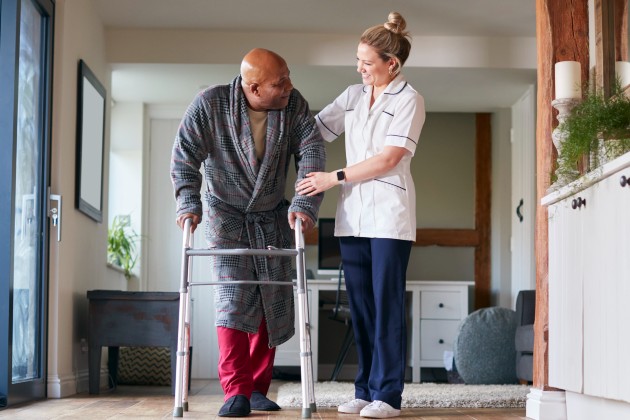Student placements in nursing homes are few and far between, but residential home placements are rarer still. Nurse educator Lia Alves wants to see that change.
Residential home placements have historically not been considered as an option as registered nurses don’t often work in these locations, making it difficult to arrange appropriate supervision and assessment.
Lia believed it was worth addressing this challenge and developed a pilot placement project that set out to prove the benefits to students, staff and residents.
“I knew there was so much to learn from a residential home setting but getting the pilot established wasn’t easy,” she says.
“I persevered because I believe there’s more time in a residential home that makes it a hugely beneficial learning environment. Everything can feel very rushed in a hospital environment, with little time for reflection and communication with those we’re caring for. It’s a similar picture in nursing homes where care is becoming increasingly complicated.”
How did students benefit?
Time spent in a residential home allows students to solidify their understanding of the principles of nursing where they can focus on the detail, Lia believes.
“Undertaking personal care is now seen by the students as a learning opportunity. Students get time with residents and a chance to gain an overall picture of their health. They can pay attention to their mobility, sleep patterns and tissue visibility, for example,” she says.
“Being present while residents have their breakfast gives students crucial insight into peoples’ nutritional status and a chance to offer support and consider when it’s appropriate to bring family into the mix. If we get the fundamentals right, this will help nursing students wherever they end up practising.”
What can be learnt from a placement in a residential home?
Some students were surprised by the range of skills they witnessed and came away with vital learnings for their future career including:
- developing communication skills, understanding the importance of person-centred care and learning how to take a rights-based approach
- undertaking and recording clinical observations, managing medication and monitoring long-term conditions
- working within a multi-disciplinary team and understanding the way health and social care systems connect.
Lia says she saw a change in the students’ attitudes as their placements progressed. Initially some felt they wouldn’t learn about anything other than fundamental care but by the end of their placements, they’d developed a deep understanding of the dynamics of social care and had experience of multi-disciplinary team working across health and social care.
Lia’s project results show that many of the students involved embraced the experience and after this placement they would consider a career in social care.
The residents felt they were helping too. Some were former nursing staff themselves and were interested in seeing what the newest generation of nurses were doing.
In a residential home setting, you realise that prioritising people is everything
What did the pilot involve?
The social care placement pilot programme hosted 4 student nurses from Plymouth University in 2 residential homes.
Students were given first-hand experience of social care and the chance to work with health care assistants and other professionals who form part of the multidisciplinary team including district nurses, GPs, community psychiatric nurses and dementia liaison staff.
The placements were designed to offer high quality learning opportunities while providing students with an understanding of the complexities and diverse work undertaken in residential homes.
The aim was to enhance students’ understanding of person-centred care in the context of older adults, develop communication and teamwork skills and instil a positive attitude about social care.
How did Lia go about setting up the pilot?
Lia needed to establish strong and trusting working relationships with home managers to ensure her training suggestions were welcomed.
“We wanted to work in partnership and make sure everyone felt they were gaining something helpful,” she explains.
Addressing the problem of not having practice supervisors and assessors on site was a priority to ensure the project as an exploratory pilot met governance and safety standards. It was planned from the start that Lia would act as an on-site mentor every day for the first 3 weeks of the 9-week placements.
This ensured students were placed with the right people and that everyone was clear what they could and couldn’t do, in this way demonstrating to Plymouth University and the NMC that standards would be maintained.
Once systems were established, distance supervision was put in place, with supervisors also visiting residential homes to provide support.
Having that time contributed to the building of therapeutic relationships, a skill that I'll take through my career
What about training options?
The pilot was an opportunity to bring training into the homes too. Instead of students travelling elsewhere for their training needs, experts were brought in, so other staff, including nursing support workers and managers, could benefit from learning on issues such as evidence-based techniques and nutritional status and tissue viability.
Medication competencies could not be completed in the residential homes and students still needed to go the university for this.
The students also got involved in training staff, presenting on topics such as pain assessments in patients with advanced dementia and preventing and spotting conjunctivitis.
“As a team we were there to help, foster hands-on learning and a sense of purpose. By showing social care staff that their work is valued they had the opportunity to reflect on their own development with some now going on to take their level 3 Care Certificate,” Lia says.
What’s the difference between a residential home and a nursing home?
Residential care homes or care homes offer a safe environment for older people where they will receive support with personal care, as well as opportunities for socialising and a programme of activities.
Nursing homes have a qualified nurse on site round-the-clock, supported by care assistants, so they can provide a higher level of care, alongside social activities.
What’s next?
Lia’s now developing the project in conjunction with Truro College, which has a university centre, to incorporate placements for allied health professionals. She’s delighted that the students involved in the pilot scheme will be coming along to share their positive experiences with the next cohort.
With the way care is continually changing, and the need to expand learning opportunity placements for the future workforce, Lia believes residential home placements could provide more opportunities for learning.
“Given we have significantly more residential care homes than nursing homes across the UK, this model has so much potential to grow as a way to support nursing and other health care students in social care placements, especially if social care placements are mandated, as is currently being discussed in England. This innovative approach demonstrates how learning opportunities can be opened up,” she says.
“The significant value of social care teams was recognised, and how they could support student development. If sustained it has the potential to make a huge difference. But for me the most important outcome from this pilot was the change of mindset and attitudes to social care for future nursing staff now they understand what social care actually means,” Lia says.








